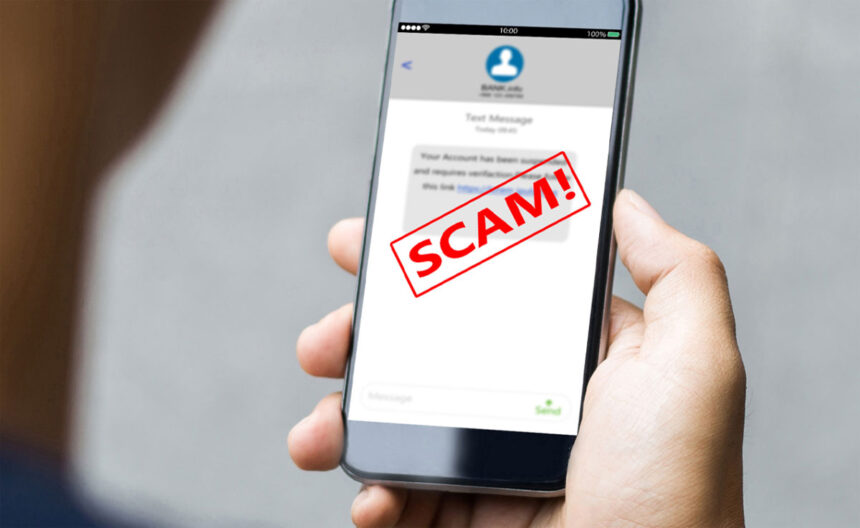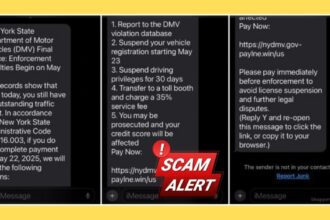In an alarming trend affecting job seekers worldwide, scammers are increasingly impersonating Robert Half—one of the world’s largest staffing firms—to target vulnerable individuals searching for employment. These sophisticated fraudsters use the company’s established reputation to lure victims into sharing personal information, financial details, and sometimes even sending money for non-existent positions.
Security experts note a significant uptick in these scams, which have become more sophisticated and harder to detect. As the job market continues to fluctuate, these schemes exploit the desperation many feel in their search for stable employment.
Overview of Robert Half Impersonation Recruitment Scams
These scams typically follow a predictable pattern. Fraudsters create fake job listings or directly contact potential victims claiming to represent Robert Half. They offer enticing remote positions with minimal qualifications required and exceptional compensation packages—often $300 to $1,200 per day for seemingly straightforward work.
“What makes these scams particularly effective is their exploitation of a trusted brand name,” explains cybersecurity expert Miranda Chen. “Robert Half has been in business for over 70 years and is publicly traded. Using their name gives these scams an immediate air of legitimacy.”
The fraud often begins with unsolicited messages through text, email, or messaging platforms like WhatsApp or Telegram. Initial contact is designed to seem professional and legitimate, with scammers sometimes creating elaborate LinkedIn profiles or websites that mimic official Robert Half branding.
One Reddit user described their experience: “I received a text claiming to be from Robert Half offering a remote position paying $35/hour with flexible hours. It seemed legitimate until they started asking about bank details for ‘direct deposit setup’ before I’d even had an interview.”
The real Robert Half has confirmed these unsolicited contacts are fraudulent. According to their official fraud alert: “Robert Half understands the importance of your privacy and security. We do not ask job candidates to pay any fee to work or to receive payment from us, make cash or check advancements, or supply sensitive financial information such as credit card numbers or banking PIN numbers.”
Communication Patterns: Red Flags in Messages and Calls
Scammers have developed specific communication patterns that job seekers should be aware of:
Initial Contact Techniques
- Unsolicited outreach: Messages often begin with a professional greeting introducing the sender as a “Robert Half recruiter” with an “exciting opportunity” to share.
- Vague yet enticing job descriptions: Positions are frequently described as “flexible,” “remote,” and requiring only basic skills or equipment.
- Unusual contact methods: While legitimate staffing agencies typically use corporate email addresses and official channels, scammers often initiate contact through text messages, WhatsApp, or Telegram.
- Generic greetings: Messages may begin with “Dear Applicant” or overly casual greetings like “Hi there!” rather than addressing you by name.
Language and Presentation
The messages often contain subtle but noticeable issues:
- Grammatical errors: While sophisticated scammers have improved their language skills, many messages still contain awkward phrasing, inconsistent capitalization, or grammatical mistakes.
- Excessive formality or informality: Communications may swing between overly formal business language and inappropriately casual tones.
- Creating false urgency: Scammers typically pressure victims to respond quickly, claiming positions are “filling fast” or that you’ve been “specially selected” for immediate consideration.
One victim shared a message they received: “Hello, this is William from Robert Half. We’ve been reviewing applications and your profile stood out. We have an immediate opening for a data entry specialist with flexible hours and pay of $40-50/hour. Can you start training tomorrow? Please respond ASAP as positions are filling quickly.”
Key Red Flags: How to Spot Robert Half’s Impersonation Fraudulent Job Offer
Security experts highlight several warning signs that can help identify these fraudulent offers:
Financial Red Flags
- Requests for payment: Robert Half explicitly states they never request payment from candidates. Any request for an “application fee,” “training materials cost,” or “accreditation fee” is a clear sign of fraud.
- Unsolicited financial information requests: Legitimate recruiters don’t ask for banking details, social security numbers, or credit card information during initial conversations or before a formal job offer.
- Promises of unrealistic compensation: Offers of $300-$1,200 daily for entry-level or simple tasks should raise immediate suspicion.
Process-Related Warning Signs
- No formal interview: Being offered a position without a proper interview process, particularly for professional roles, is highly unusual for legitimate staffing firms.
- Unconventional onboarding: Requests to purchase equipment, software, or gift cards as part of the “onboarding process” are classic scam tactics.
- Lack of company knowledge: Scammers often have limited knowledge about Robert Half’s actual operations, services, or legitimate hiring processes.
Communication Red Flags
- Non-corporate email addresses: Legitimate Robert Half employees use official email domains ([email protected] or country-specific variations like [email protected]).
- Pressure tactics: High-pressure techniques designed to rush decisions are rarely used by professional recruiters.
- Limited online presence: The “recruiter” contacting you cannot be verified on LinkedIn or through Robert Half’s official channels.
Protecting Yourself from Fake Recruitment Scams
Taking proactive steps can significantly reduce your risk of falling victim to employment scams:
Verification Strategies
- Contact Robert Half directly: If you receive an unsolicited job offer claiming to be from Robert Half, contact their official local office through information found on their website (not through details provided in the suspicious message).
- Check official job listings: Verify any position against those posted on Robert Half’s official website.
- Research thoroughly: Search the recruiter’s name online and on LinkedIn to confirm their affiliation with Robert Half.
Safe Communication Practices
- Never share sensitive information upfront: Legitimate recruiters don’t need your financial details, social security number, or scans of identification documents during initial discussions.
- Use official channels: Stick to communication through corporate email addresses or official platforms rather than messaging apps.
- Trust your instincts: If something feels wrong or too good to be true, proceed with extreme caution.
Response Protocols
- Don’t click suspicious links: Avoid clicking on links or downloading attachments from unsolicited messages.
- Report suspicious activity: Forward suspicious communications to Robert Half’s official reporting channels ([email protected]).
- Document everything: Keep records of all communications if you need to report the incident later.
The Technological Evolution of Robert Half Recruitment Scams
What makes the current wave of job scams particularly concerning is their increasing sophistication. Modern scammers are using advanced techniques to appear legitimate:
- Cloned websites: Creating fake websites that closely mimic Robert Half’s official site, sometimes with only slight differences in the URL.
- Deepfake interviews: Some sophisticated scammers are beginning to use AI technology to impersonate recruiters in video interviews.
- Data scraping: Using information from legitimate job boards and social media profiles to personalize scam attempts.
- SEO manipulation: Creating fake job listings that appear in search results alongside legitimate opportunities.
“The level of sophistication has increased dramatically,” notes cybersecurity researcher Dr. James Moritz. “We’re seeing multi-stage scams that combine social engineering, technological deception, and psychological manipulation. These aren’t just crude attempts anymore—they’re campaigns designed by organized criminal enterprises.”
The Impact on Job Seekers and the Industry
The psychological and financial impact of these scams extends beyond immediate losses. For job seekers, especially those who have been unemployed for extended periods, falling victim to a scam can create lasting damage:
- Financial hardship: Direct financial losses from fees or identity theft
- Psychological impact: Increased anxiety and diminished trust in legitimate job opportunities
- Time loss: Valuable time wasted pursuing fake opportunities
- Privacy concerns: Exposure of personal data that could be used in future scams
The staffing industry also suffers as these scams erode trust in legitimate recruitment processes. Companies like Robert Half must invest significant resources in educating the public, monitoring for fraudulent use of their brand, and implementing additional verification steps in their processes.
Frequently Asked Questions
1. Is a Robert Half Job Offer via Text or WhatsApp Legitimate?
No, Robert Half explicitly states they do not make job offers or request applications through messaging services like WhatsApp or Telegram. According to their official guidance: “Robert Half do not make job offers to candidates or request candidates to send applications through instant messaging services such as Telegram and WhatsApp.” Legitimate recruitment from Robert Half comes through their official website, corporate email addresses, or direct contact after you’ve applied through proper channels.
2. Is Robert Half a Legitimate Recruitment Agency?
Yes, Robert Half International is one of the world’s largest staffing firms, founded in 1948 and publicly traded on the NYSE. The company operates legitimately in numerous countries worldwide, specializing in accounting, finance, technology, legal, creative, and administrative staffing. However, this strong reputation is precisely why scammers frequently impersonate Robert Half—they leverage the company’s legitimacy to gain victims’ trust.
3. What Should I Do If I’ve Already Shared Personal Information?
If you’ve shared personal information with someone you now suspect is a scammer:
- Contact your bank immediately if you’ve shared financial information
- Place a fraud alert on your credit reports with major credit bureaus
- Report the incident to local law enforcement and national consumer protection agencies
- Change passwords for any accounts that may be compromised
- Monitor your accounts closely for suspicious activity
4. How Can I Verify If a Robert Half Recruiter Is Legitimate?
To verify a Robert Half recruiter’s legitimacy:
- Check their email address—it should follow the format [email protected] (or country-specific variants)
- Call your local Robert Half office directly (using contact information from their official website) to confirm the recruiter works there
- For suspicious messages, contact Robert Half’s verification channels directly (1-800-803-9336 in some regions or email [email protected])
- Never rely solely on contact information provided in the suspicious message
5. Are There Legitimate Remote Jobs Through Robert Half?
Yes, Robert Half does offer legitimate remote and hybrid positions. However, these opportunities follow proper recruitment processes, including formal applications, structured interviews, and professional onboarding. Legitimate remote positions are posted on Robert Half’s official website and professional job boards, not offered through unsolicited messages. The company follows standard industry practices for screening, interviewing, and hiring candidates.
Global Response to Recruitment Fraud
Law enforcement agencies worldwide are increasingly focused on combating job scams. The FBI’s Internet Crime Complaint Center (IC3) reported that in 2024, employment scams resulted in hundreds of millions in losses across the United States alone, making it one of the most costly forms of internet fraud.
Legitimate staffing firms like Robert Half have implemented several countermeasures:
- Publishing comprehensive fraud awareness resources
- Establishing dedicated reporting channels
- Implementing additional verification steps in their recruitment processes
- Working with law enforcement to identify and prosecute scammers
- Collaborating with social media platforms to remove fraudulent profiles
Conclusion: Vigilance in the Digital Job Market
As remote work opportunities continue to expand, so too does the sophistication of scams targeting job seekers. The misuse of Robert Half’s trusted name represents just one example of how fraudsters exploit legitimate brands to lend credibility to their schemes.
Protecting yourself requires a combination of healthy skepticism, thorough research, and adherence to secure job search practices. Remember that legitimate employers and staffing agencies never request payment from job seekers, rarely offer extraordinary compensation for simple tasks, and always follow professional recruitment processes that include proper screening and interviews.
By recognizing the patterns and tactics used in these scams, job seekers can navigate the digital employment landscape more safely. When in doubt, always verify through official channels and remember that protecting your personal information should take priority over even the most attractive job opportunity.
If you encounter suspicious job offers claiming to be from Robert Half, report them immediately to [email protected] or through your local Robert Half office. Together, job seekers and legitimate companies can help combat these fraudulent schemes and maintain the integrity of the hiring process.
This article is for informational purposes only and does not constitute legal or financial advice. If you believe you have been targeted by a scam, contact appropriate authorities in your jurisdiction.



































